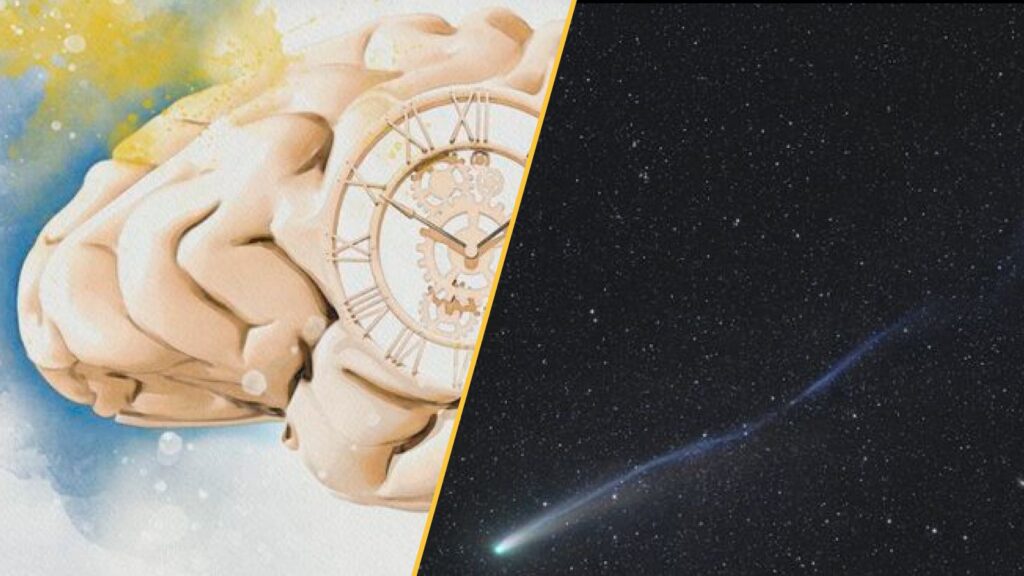This week’s science news has been comet-ing thick and fast, with a flurry of reports on three dusty space snowballs that are hurtling through our cosmic backyard.
First are the comets Lemmon and SWAN, which reached their peaks in brightness in Earth’s skies this week, enabling skywatchers to easily glimpse them. This led to some stunning observations, with Lemmon captured flying through a sky drenched in auroral technicolor over Scotland and getting its tail temporarily shredded by solar wind above Czechia (also known as the Czech Republic).
Could the Milky Way’s mysterious glow be dark matter?

There’s a mysterious and diffuse glow at the center of our Milky Way galaxy, a flattened disk of unusually energetic gamma rays that has puzzled astronomers for more than a decade. Now, a new study has given weight to a possible explanation: colliding pockets of dark matter.
The results, made using high-resolution supercomputer simulations, suggest that our galaxy’s dark matter could have been squished into an oval-like shape through collisions and gravitational mergers.
The findings could lead to our first ever detection of the mysterious component thought to make up 85% of the universe’s matter, solving a major cosmic mystery.
Discover more space news
—Astronomers spot giant hidden ‘bridge’ and record-breaking tail between 2 dwarf galaxies
—James Webb telescope finds that galaxies in the early universe were much more chaotic than we thought
—Astronomers detect first ‘heartbeat’ of a newborn star hidden within a powerful cosmic explosion
Life’s Little Mysteries

Mosquitos are a near-ubiquitous animal and humanity’s deadliest predator — up to 110 trillion mozzies on the planet inflict illnesses upon 700 million people a year, resulting in nearly a million deaths over the same period.
So is there anywhere on the planet where the buzzing pests don’t exist? We thought we knew the answer, but a surprising update changed everything this week.
—If you enjoyed this, sign up for our Life’s Little Mysteries newsletter
Why time moves faster as we age

It’s a commonly observed adage: As we get slower, time goes by faster. There have been plenty of psychological explanations for this experience, but now scientists have finally found hints of its neurological origins.
The process is called neural dedifferentiation, whereby the activity of different brain regions becomes less specific as we age, leading our brains to shift through fewer distinct states that it may use to mark the passage of time. And if older brains are logging fewer “events” in a given time frame, maybe that’s why time seems to fly by.
Discover more health news
—You don’t need to be very happy to avoid an early death from chronic disease, study finds
—Diagnostic dilemma: A toddler accidently ate gonorrhea bacteria from a lab dish
—New eye implants combined with augmented-reality glasses help blind people read again in small trial
Also in science news this week
—1,300-year-old poop reveals pathogens plagued prehistoric people in Mexico’s ‘Cave of the Dead Children’
—‘Illegal’ metal detectorist found a huge hoard of Roman treasure in Germany — and kept it hidden for 8 years
Science long read

Since the Neanderthal genome was first sequenced in 2010, some scientists have tentatively proposed the resurrection of one of modern humans’ closest extinct relatives (the other being Denisovans). But just how would it be done? Is it even possible? And even if we can, should we? Live Science sought out the answers.
Something for the weekend
If you’re looking for something a little longer to read over the weekend, here are some of the best interviews, crosswords and dives into science history published this week.
Live Science crossword puzzle #15: Explosive death of a star — 11 down [Crossword]
Science history: Scientists use ‘click chemistry’ to watch molecules in living organisms — Oct. 23, 2007 [Science history]
Science in pictures

This week, Live Science published a fascinating writeup on this aerial photo taken by an astronaut that shows the islands of Dek and Daga in Ethiopia’s Lake Tana.
The country’s northwestern, algae-infested lake hosts a number of islands (some of which only appear during the rainy season) and these islands are home in turn to a plethora of monasteries and churches. The religious buildings were built on these islands partly to protect the country’s most valuable holy relics and the mummified remains of at least five emperors during times of war and upheaval.
Want more science news? Follow our Live Science WhatsApp Channel for the latest discoveries as they happen. It’s the best way to get our expert reporting on the go, but if you don’t use WhatsApp we’re also on Facebook, X (formerly Twitter), Flipboard, Instagram, TikTok, Bluesky and LinkedIn.
